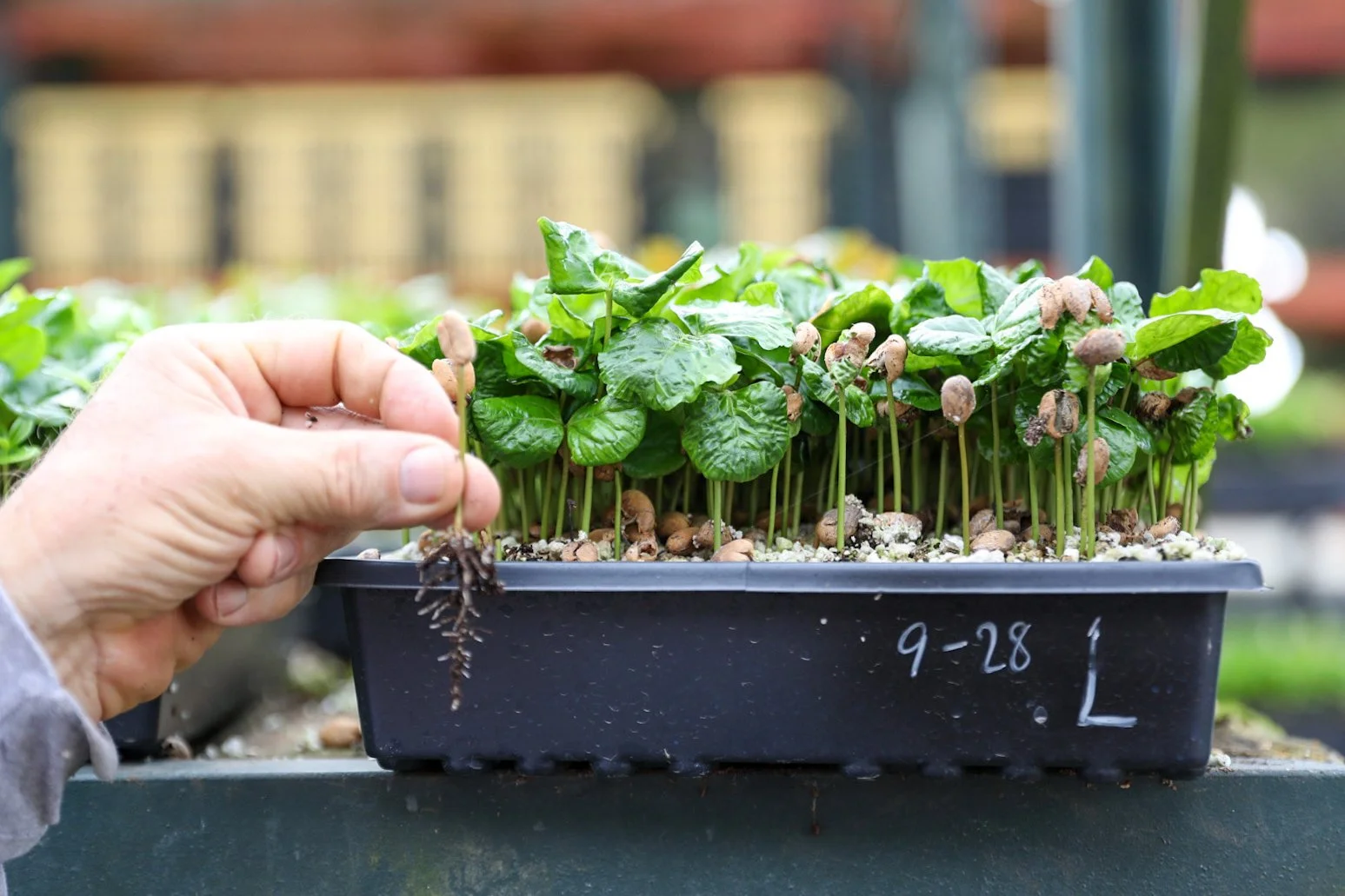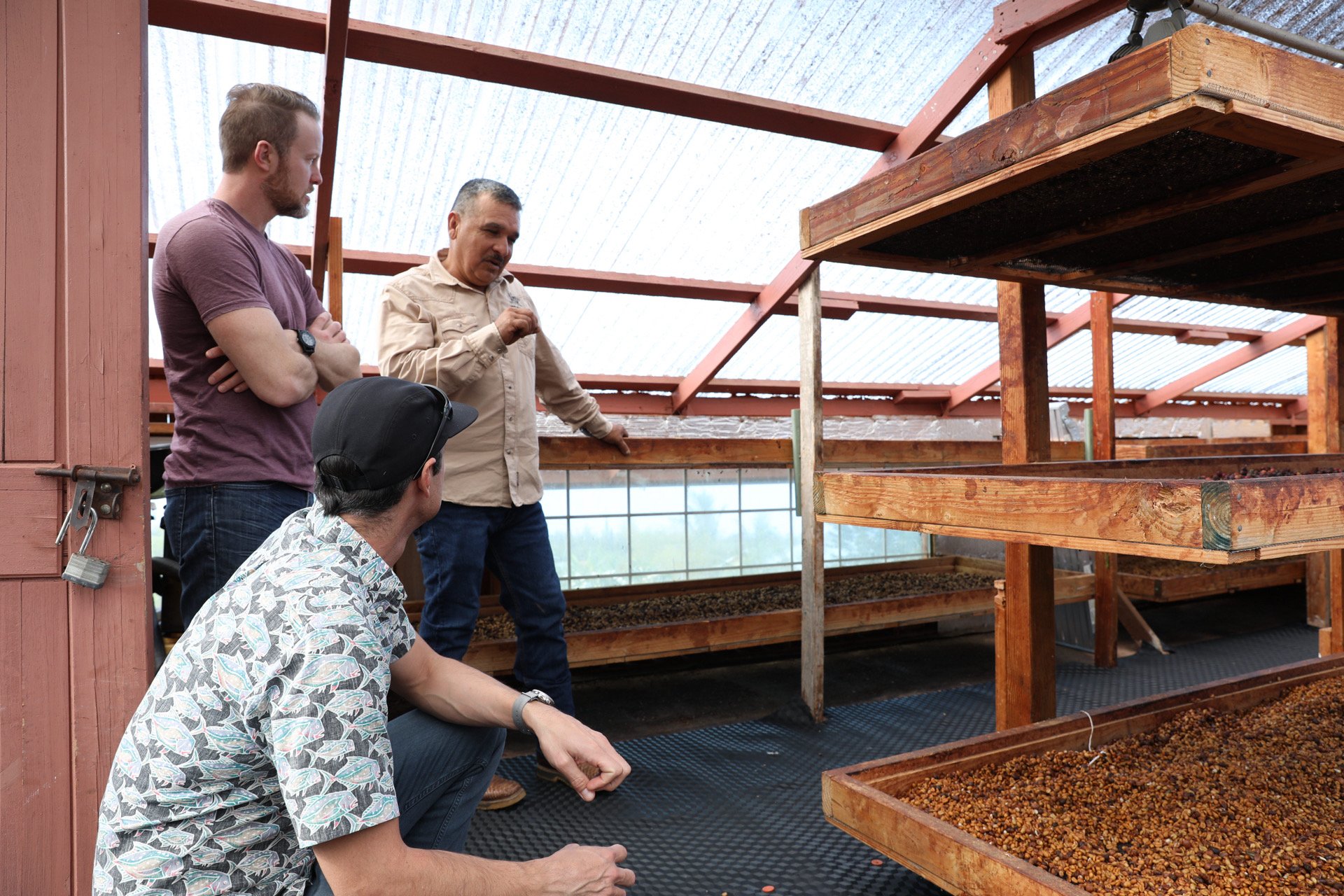Why coffee prices are going up
As of this writing on 3/13/25 we are experiencing tectonic shifts in how coffee is sourced – and how much it costs us as roasters. We’d like to take this moment to help educate you, as we ourselves are getting an education in shifting coffee economics.
The Cliff Notes
Green coffee prices have rocketed past historic highs due to climate challenges, global supply chain disruptions, and increased demand. Green coffee pricing for us has gone up 120% in the last year. It is currently impossible to buy high-quality, delicious coffee at the artificially low historical prices that we’ve all become accustomed to
Rather than cutting corners on quality, we’re choosing to maintain the exceptional coffee you know and love. We remain committed to sourcing from trusted partners, roasting with excellence, and providing you with the best coffee available. As coffee prices fluctuate, we will always do everything we can to keep prices fair.
We’ll get more into pricing in a second, but first…
What is the difference between high quality and low quality coffee?
The species of the coffee tree: Arabica vs. Robusta
Generally speaking, Arabica (about 60-70% of world production) is a more delicate plant species that can be prone to disease, but it features smooth, intricate flavors and aromas that have historically driven higher prices than Robusta.
Robusta (about 30% of world production) is a heartier plant grown in lower elevations with twice the caffeine as Arabica. It has noticeably more earthy, nutty flavors and a creamier body. This species has historically been used for instant coffee due to its lower cost of production.
Currently we buy only Arabica coffee. However, we're interested in experimenting with Robusta as the climate changes, growing patterns shift, and as advances in processing are made to create more intricate flavor profiles.
Where the coffee is grown
Soil composition - nutrients, minerals, and overall health due to resting and replenishment provide the basic building blocks for the health of the plant and the fruit it produces.
Access to the right amount of rain (most coffee is not planted with irrigation), sun, and a particular temperature band on a generally predictable schedule increases quality.
Growing elevation. Coffee grown at higher elevations with cooler temperatures tend to extend fruit ripening, leading to more sugar development, producing greater perceived sweetness and complexity.
Farming factors
Farmer access to financing to purchase fertilizer, pest control, farm tools, to pay laborers, and for equipment purchase/maintenance.
Availability of labor. Coffee farmers hire day laborers to hand pick the ripe coffee cherries off of the tree over the course of a 3-4 month harvest season. The farmers also have a few full-time staff to oversee the complex processing that occurs to get the seed (aka the bean) out of the fruit and ready for milling.
Selecting ripe coffee cherries when harvesting is especially important. If the “strip-picking” method is used, where all the cherries on the branch are stripped off without regard to ripeness, the result is usually lower quality.
Careful attention to detail in how the seed is extracted from the fruit, dried, cleaned, sorted, roasted, and brewed.
What influences the price of coffee?
Coffee is the second most traded commodity in the world (oil is the first). There is something called the "C Market," which sets the standard price for commodity-grade Arabica coffee by reflecting worldwide supply and demand dynamics, as well as investor speculation.
There is a tangible quality difference between the commodity coffee bought and sold on the C Market and the high quality specialty coffee that we purchase. Specialty coffee makes up as little as five percent of the overall global coffee trade. Commodity coffee has limited and basic grading standards that make it easy to exchange (trade) on the C Market. High quality specialty coffee, by contrast, has quantifiable characteristics that distinguish one lot of coffee from another, making it a unique and valuable good.
The C Market price for commodity coffee fluctuates on an hourly and daily basis. This price is used as the global benchmark for all Arabica coffee transactions, including specialty coffee.
When the supply of coffee produced in the world goes down, the price of coffee will rise. When consumer demand for coffee goes up, the price of coffee will also rise. Prices fall when the opposite of those two scenarios happen.
Things like adverse weather, political instability, and economic volatility all impact the price of coffee.
Why do we think coffee is only going to get more expensive?
Extreme weather is decreasing the worldwide supply of coffee. By some estimates, the world's supply of coffee for the 2025/26 harvest is expected to decrease by as much as 7 percent.
Political instability – wars in Ukraine, the Middle East, and Africa have disrupted global supply chain logistics, closed key trade routes, and created generalized uncertainty about the global geopolitical order. As a byproduct, the shipping companies that move coffee around the world are charging more for freight. Additionally there are fewer shipping containers available for trade, which also increases costs for coffee importers, who pass those costs to roasters.
Trade Wars – these geopolitical disputes involve government imposed tariffs (aka taxes) on imported goods. This means that roasters will pay more for raw coffee when tariffs impact coffee-producing countries (like Mexico). Or countries where decaf is processed (Mexico/Canada). With tariffs imposed on China, things like the packaging for roasted coffee and some of the equipment we use will see increased costs.
Security in coffee producing countries – Dangerous living conditions – from cartels and the like – create greater migratory incentive for normal people trying to make a living. When more people leave the country, there are less laborers available to pick the coffee from the trees. Farmers are having a hard time finding labor, and when they do, it is more expensive. This results in higher prices and lower quality coffee… even specialty coffee.
Market/economic volatility – one byproduct of global political instability is uncertainty in markets. Banks and investors typically restrict the supply of available capital in this type of market, meaning that it costs businesses more to operate. Coffee farmers have less access to capital to invest in their farms. Exporters have less access to capital and/or higher interest rates to borrow cash used to purchase coffee from farmers. Importers face the same situation regarding their purchases from exporters. If importers have less green coffee inventory on hand, that coffee is more expensive to roasters. When roasters have to pay more, their customers have to pay more as well.
What does all this mean for you?
At this moment the reality is that coffee is by far the most expensive it has ever been in history. Even while we work to secure longer term contracts with our suppliers, the market conditions are such that producers are more inclined to sell into their local market at historically high prices than to engage in long-term fixed price negotiations.
We are looking to protect our customers and our supply chain with a long term vision focused on relationships with trusted partners. Instead of trying to find the cheapest coffee to keep costs down for you, we're looking to secure long term relationships with importers, exporters, and – where possible – certain coffee farms. We are developing values-based partnerships with like-minded collaborators who want to work together to mitigate all of the risks we've talked about. This difficult yet worthwhile endeavor secures our supply of coffee and provides a secure buyer for the coffee farmers, exporters, and importers who sell us the coffee. If you decide to invest in us and support this human-centered vision of the coffee supply chain, we’re going to do everything in our power to continue to supply you with the highest quality product that you can feel good about.
As our prices go up, our level of service and the quality of our product will also rise. We won't simply buy a cheaper product and charge you the same as what you've been paying. If you want to continue serving yourself and your customers the high-quality coffee to which they've grown accustomed, we can - and always will - help you deliver that value!
Thank you for reading and please reach out with any questions.



